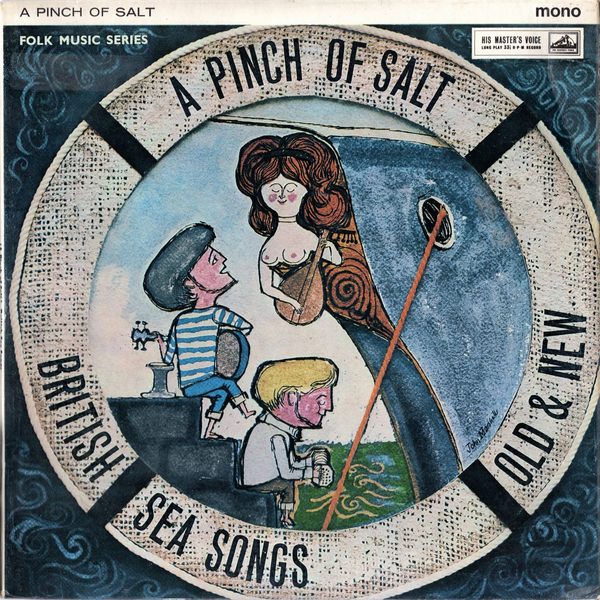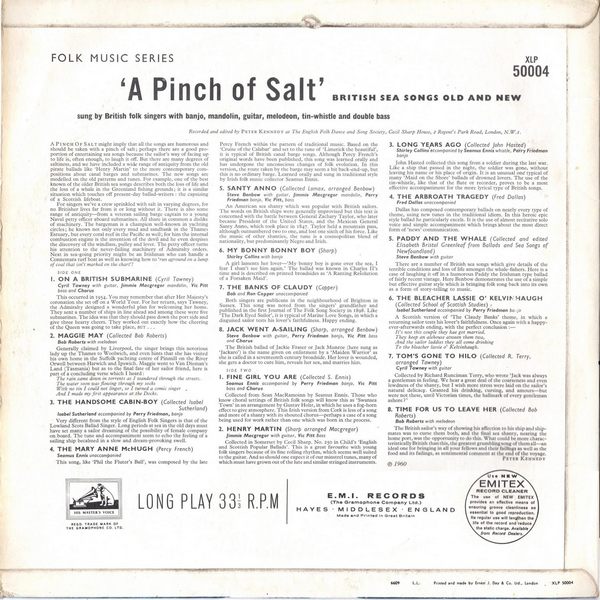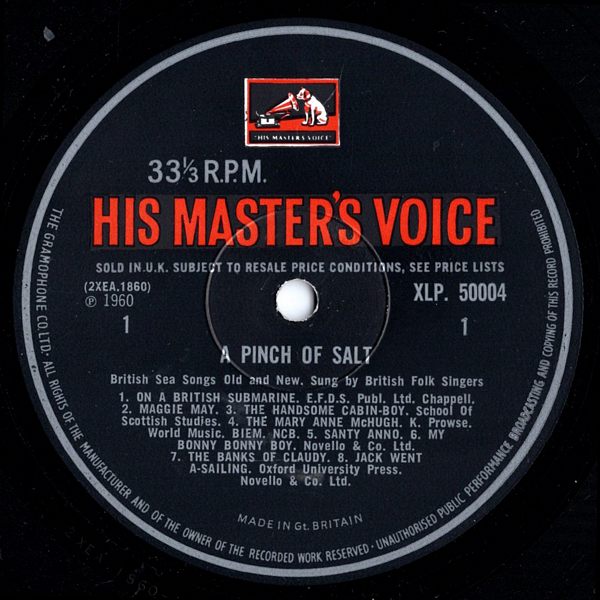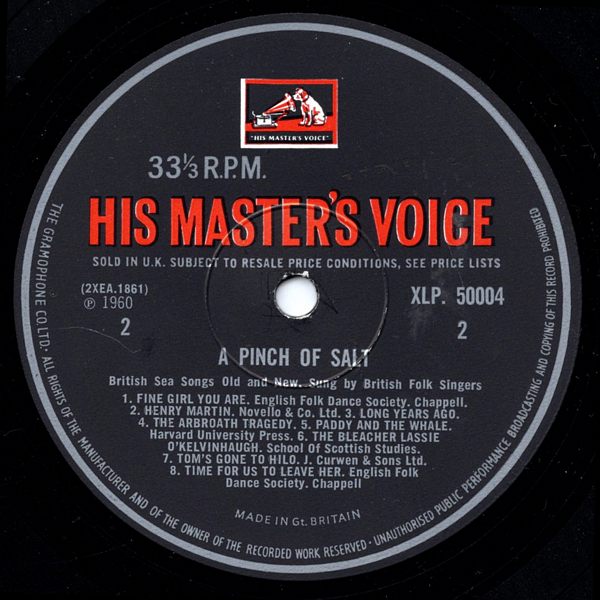
 |



|
Sleeve Notes
A PINCH OF SALT might imply that all the songs are humorous and should be taken with a pinch of salt; perhaps there are a good proportion of entertaining sea songs because the sailor's way of facing up to life is, often enough, to laugh it off. But there are many degrees of saltiness, and we have included a wide range of antiquity from the old pirate ballads like 'Henry Martin' to the more contemporary compositions about canal barges and submarines. The new songs are modelled on the old patterns and tunes. For example, one of the best known of the older British sea songs describes both the loss of life and . the loss of a whale in the Greenland fishing grounds; it is a similar situation which touches off present-day ballad-writers : the capsizing of a Scottish lifeboat.
For singers we've a crew sprinkled with salt in varying degrees, for no Britisher lives far from it or long without it. There is also some range of antiquity-from a veteran sailing barge captain to a young Naval petty officer aboard submarines. All share in common a dislike of machinery. The bargeman is a champion well-known in yachting circles; he knows not only every mud and sandbank in the Thames Estuary, but every coral reef in the Pacific as well; for him the internal combustion engine is the invention of the devil and he even despises the discovery of the windlass, pulley and lever. The petty officer turns his attention to the never-failing machinery of Admiralty orders. Next in sea-going priority might be an Irishman who can handle a Connemara turf boat as well as knowing how to 'run aground on a lump of coal that isn't marked on the chart'!
On A British Submarine — This occurred in 1954. You may remember that after Her Majesty's coronation she set off on a World Tour. For her return, says Tawney, the Admiralty designed a wonderful plan for welcoming her home. They sent a number of ships in line ahead and among these were five submarines. The idea was that they should pass down the port side and give three hearty cheers. They worked out exactly how the cheering of the Queen was going to take place, BUT …
Maggie May — Generally claimed by Liverpool, the singer brings this notorious lady up the Thames to Woolwich, and even hints that she has visited his own home in the Suffolk yachting centre of Pinmill on the River Orwell between Harwich and Ipswich. Maggie went to Van Dieman's Land (Tasmania) but as to the final fate of her sailor friend, here is part of a concluding verse which I heard:
The rain came down in torrents as I wandered through the streets.
The water soon was flowing through my socks
With no tin I could not linger, so I turned a comic singer
And I made my first appearance at the Docks.
The Handsome Cabin-Boy — Very different from the style of English Folk Singers is that of the Lowland Scots Ballad Singer. Long periods at sea in the old days must have set many a sailor dreaming of the possibility of female company on board. The tune and accompaniment seem to echo the feeling of a sailing ship becalmed in a slow and dream-provoking swell.
The Mary Anne McHugh — This song, like 'Phil the Fluter's Ball', was composed by the late Percy French within the pattern of traditional music. Based on the 'Cruise of the Calabar' and set to the tune of 'Limerick the beautiful', it is typical of British canal barge songs. Although Percy French's original words have been published, this song was learned orally and has undergone the unconscious changes of folk evolution. In this version, the route taken by the barge may seem a bit back-end-up, but this no ordinary barge. Learned orally and sung in traditional style by Irish folk music collector Seamus Ennis.
Santy Anno — An American sea shanty which was popular with British sailors. The words on British ships were generally improvised but this text is concerned with the battle between General Zachary Taylor, who later became President of the United States, and the Mexican General Santy Anno, which took place in 1847. Taylor held a mountain pass, although outnumbered two to one, and lost one sixth of his force. Like the music of other shanties, the tune is a cosmopolitan blend of nationality, but predominantly Negro and Irish.
My Bonny Bonny Boy — A girl laments her lover — 'My bonny boy is gone over the sea, I fear I shan't see him again.' The ballad was known in Charles II's time and is described on printed broadsides as 'A Ranting Resolution of a Forsaken Maid'.
The Banks Of Claudy — Both singers are publicans in the neighbourhood of Brighton in Sussex. This song was noted from the singers' grandfather and published in the first Journal of The Folk Song Society in 1898. Like 'The Dark Eyed Sailor', it is typical of Marine Love Songs, in which a disguised sailor tests his lover's faithfulness. Happy ending.
Jack Went A-Sailing — The British ballad of Jackie Fraser or Jack Munroe (here sung as 'Jackaro') is the name given on enlistment by a 'Maiden Warrior' as she is called in a seventeenth century broadside. Her lover is wounded, she gets a doctor to cure him, reveals her sex, and marries him.
Fine Girl You Are — Collected from Seán MacRamoinn by Seamus Ennis. Those who know choral settings of British folk songs will know this as 'Swansea Town' in an arrangement by Gustav Holst, in which he uses a foghorn effect to give atmosphere. This Irish version from Cork is less of a song and more of a shanty with its shouted chorus — perhaps a case of a song being used for work rather than one which was born in the process.
Henry Martin — Collected in Somerset by Cecil Sharp. No. 250 in Child's 'English and Scottish Popular Ballads'. This a great favourite with young folk singers because of its fine rolling rhythm, which seems well suited to the guitar. And so should one expect it of our minstrel tunes, many of which must have grown out of the lute and similar stringed instruments.
Long Years Ago — John Hasted collected this song from a soldier during the last war. Like a ship that passed in the night, the soldier was wine, without leaving his name or his place of origin. It is an unusual one typical of many 'Maid on the Shore' ballads of drowned lovers. The use of the tin-whistle, like that of the flute or recorder, proves to be a most effective accompaniment for the more lyrical type of British songs.
The Arbroath Tragedy — Dallas has composed contemporary ballads on nearly every type of theme, using new tunes in the traditional idiom. In this heroic epic style ballad he particularly excels. It is the use of almost recitative solo voice and simple accompaniment which brings about the most direct form of 'news' communication.
Paddy And The Whale — There are a number of British sea songs which give details of the terrible conditions and loss of life amongst the whale-fishers. Here is a case of laughing it off in a humorous Paddy the Irishman type ballad of fairly recent vintage. Here Benbow demonstrates the use of a simple but effective guitar style which is bringing folk song back into its own as a form of story-telling to music.
The Bleacher Lassie O' Kelvinhaugh — A Scottish version of 'The Claudy Banks' theme, in which a returning sailor tests his lover's faithfulness. Once again with a happy-ever-afterwards ending, with the perfect conclusion:
It's noo this couple they hae got married.
They keep an alehouse atween them twa,
And the sailor laddies they all come drinking
To the bleacher lassie o' Kelvinhaugh.
Tom's Gone To Hilo — Collected by Richard Runciman Terry, who wrote 'jack was always a gentleman in feeling. We hear a great deal of the coarseness and even lewdness of the shanty, but I wish more stress were laid on the sailor's natural delicacy. Granted his drinking, cursing, and amours — but were not these, until Victorian times, the hallmark of every gentleman ashore ? '
Time For Us To Leave Her — The British sailor's way of showing his affection to his ship and shipmates was to curse them both, and the final sea shanty, nearing the home port, was the opportunity to do this. What could be more characteristically British than this, the greatest grumbling song of them all — an ideal one for bringing in all your fellows and their failings as well as the food and its failings, as sentimental comment at the end of the voyage.
PETER KENNEDY
© 1960